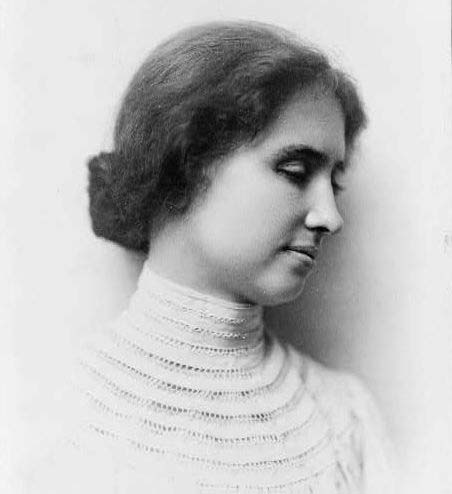Helen Keller was a radical. Helen Keller was a socialist. She was an enemy of Woodrow Wilson and was constantly fighting for the working class.
Living during a time where you were either a capitalist or you were the enemy, many news outlets crucified her and condemned her thoughts as side effects of her disability. In How I Became a Socialist, Keller writes:
The Brooklyn Eagle says, apropos of me, and socialism, that Helen Keller's "mistakes spring out of the manifest limitations of her development." Some years ago I met a gentleman who was introduced to me as Mr. McKelway, editor of the Brooklyn Eagle...At that time the compliments he paid me were so generous that I blush to remember them. But now that I have come out for socialism he reminds me and the public that I am blind and deaf and especially liable to error.Helen Keller studied the causes of blindness and found that it is not distributed uniformly throughout society. The lower class are more likely to become blind due to a number of reasons, mainly unsafe work environments that Keller attributed to corporate greed. She founded Helen Keller International, which works to fight disparities and the causes of blindness as well as their consequences, malnutrion and bad health.
Oh, ridiculous Brooklyn Eagle! What an ungallant bird it is! Socially blind and deaf, it defends an intolerable system, a system that is the cause of much of the physical blindness and deafness which we are trying to prevent. The Eagle is willing to help us prevent misery provided, always provided, that we do not attack the industrial tyranny which supports it and stops its ears and clouds its vision. The Eagle and I are at war.
Helen Keller notably spoke against war and the machine that causes war. In her speech Strike Against War, Keller asserts that "wage slaves" are brainwashed to fight for "country", when really they are fighting for the economic interest of few.
Every modern war has had its root in exploitation. The Civil War was fought to decide whether to slaveholders of the South or the capitalists of the North should exploit the West. The Spanish-American War decided that the United States should exploit Cuba and the Philippines. The South African War decided that the British should exploit the diamond mines. The Russo-Japanese War decided that Japan should exploit Korea. The present war is to decide who shall exploit the Balkans, Turkey, Persia, Egypt, India, China, Africa. And we are whetting our sword to scare the victors into sharing the spoils with us. Now, the workers are not interested in the spoils; they will not get any of them anyway.She goes on the explain how we really have no country for which to fight.
This terrible sacrifice would be comprehensible if the thing you die for and call country fed, clothed, housed and warmed you, educated and cherished your children. I think the workers are the most unselfish of the children of men; they toil and live and die for other people's country, other people's sentiments, other people's liberties and other people's happiness!Helen Keller stood up in the face of adversary many times throughout her life, before and after she overcame her disabilities. She held opinions many would consider radical even today.
Most importantly, she took action. Thank you Helen Keller. Fight On.




